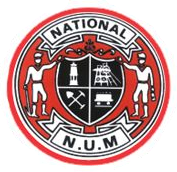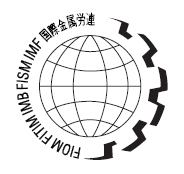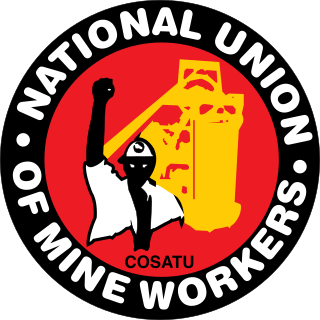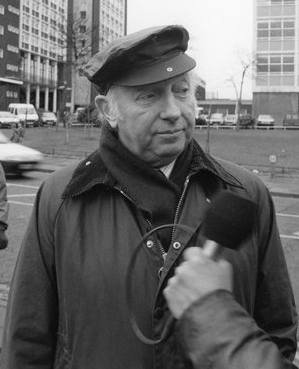
The World Federation of Trade Unions (WFTU) is an international federation of trade unions established in 1945. Founded in the immediate aftermath of World War Two, the organization built on the pre-war legacy of the International Federation of Trade Unions as a single structure for trade unions world-wide, following the World Trade Union Conference in London, United Kingdom.

The 1984–1985 United Kingdom miners' strike was a major industrial action within the British coal industry in an attempt to prevent closures of pits that the government deemed "uneconomic" in the coal industry, which had been nationalised in 1947. It was led by Arthur Scargill of the National Union of Mineworkers (NUM) against the National Coal Board (NCB), a government agency. Opposition to the strike was led by the Conservative government of Prime Minister Margaret Thatcher, who wanted to reduce the power of the trade unions.

The National Union of Mineworkers (NUM) is a trade union for coal miners in Great Britain, formed in 1945 from the Miners' Federation of Great Britain (MFGB). The NUM took part in three national miners' strikes, in 1972, 1974 and 1984–85. Following the 1984–85 strike, and the subsequent closure of most of Britain's coal mines, it became a much smaller union. It had around 170,000 members when Arthur Scargill became leader in 1981, a figure which had fallen in 2023 to an active membership of 82.

The International Metalworkers' Federation (IMF) was a global union federation of metalworkers' trade unions, founded in Zürich, Switzerland in August 1893. As of 2009, the IMF had more than 200 member organisations in 100 countries, representing a combined membership of 25 million workers.

The International Federation of Chemical, Energy, Mine and General Workers' Unions (ICEM) was a global union federation of trade unions. As of November 2007, ICEM represented 467 industrial trade unions in 132 countries, claiming a membership of over 20 million workers.
The Miners' Federation of Great Britain (MFGB) was established after a meeting of local mining trade unions in Newport, Wales in 1888. The federation was formed to represent and co-ordinate the affairs of local and regional miners' unions in England, Scotland and Wales whose associations remained largely autonomous. At its peak, the federation represented nearly one million workers. It was reorganised into the National Union of Mineworkers in 1945.

The National Union of Mineworkers (NUM) is a mainly mining industry related trade union, an organisation of workers with common goals through organised labour, in South Africa. With a membership of 300,000 as of 2014, it is the largest affiliate of the Congress of South African Trade Unions (COSATU).
The National Amalgamated Coal Workers' Union was a trade union in the United Kingdom which existed between 1889 and 1922. It represented coal porters and carmen.

The South Wales Miners' Federation (SWMF), nicknamed "The Fed", was a trade union for coal miners in South Wales. It survives as the South Wales Area of the National Union of Mineworkers.

The International Federation of Trade Unions was an international organization of trade unions, existing between 1919 and 1945. IFTU had its roots in the pre-war IFTU.
The Kent Miners' Association was a trade union in the United Kingdom which existed between 1915 and 1945, representing coal miners in the county of Kent. After 1945 it was reorganised as the Kent Area of the National Union of Mineworkers.

Arthur Scargill is a British trade unionist who was President of the National Union of Mineworkers (NUM) from 1982 to 2002. He is best known for leading the 1984–1985 UK miners' strike, a major event in the history of the British labour movement.
The Trade Unions International of Miners was a trade union international affiliated with the World Federation of Trade Unions.
The 1969 United Kingdom miners' strike was an unofficial strike that involved 140 of the 307 collieries owned by the National Coal Board, including all collieries in the Yorkshire area. The strike began on 13 October 1969 and lasted for roughly two weeks, with some pits returning to work before others. The NCB lost £15 million and 2.5 million tonnes of coal as a result of the strike.
The South African Congress of Trade Unions (SACTU) was a national trade union federation in South Africa.
The History of trade unions in the United Kingdom covers British trade union organisation, activity, ideas, politics, and impact, from the early 19th century to the recent past. For current status see Trade unions in the United Kingdom.

The International Federation of Chemical, Energy and General Workers' Unions (ICEF) was a global union federation of trade unions.
The National Federation of Colliery Officials was a trade union representing colliery workers in the United Kingdom who were not involved in manual labour.
Achille Delattre was a Belgian politician and trade unionist.
The Union of Mineworkers of Belgium was a trade union representing coal miners in Belgium.










